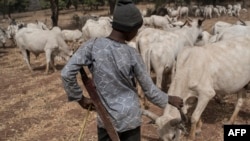At least 6,000 people and 2,000 cattle fleeing conflict in Nigeria's Taraba state have been trapped under difficult humanitarian conditions in Cameroonian border villages. Dozens of the refugees are reported to have died and Cameroon medical staff are calling for assistance to care for the survivors.
Twenty refugees have just arrived at the Atta Catholic health center. They look tired, hungry and thirsty after travelling long distances on foot from Nigeria's Taraba state. Their spokesman, 53-year old Bello Dewa Oumarou, said they are fleeing violent conflicts between the Mambilas and Fulani Muslim herdsmen.
"Most of my people have ran off to Cameroon. The Mambila people wanted to wipe out the Fulani in the whole of Jos plateau. We tried to calm our people. We didn't think this thing would escalate to this extent. We didn't think Mambila people, people that we have stayed with for hundred years, we don't think these people would hurt us to that extent and say they will wipe us out completely," he said.
A majority of those arriving are women and children. Jean Marie Koue, medical officer of the health center, said they no longer have enough space and medication to treat the wounded.
He said many of the refugees come in with wounds inflicted during fighting while others suffer memory loss because they saw entire families being killed. He says many women delivered babies while escaping from Nigeria and some others delivered the same day they arrived in Cameroon and need urgent medical attention.
The Cameroon Red Cross has deployed its local staff to the border area. Moise Noursam Lemy is its representative in Atta.
He said the Cameroon Red Cross is doing a head count of the refugees from Nigeria and educating the local population and traditional rulers not to be hostile towards them. He said the refugees need help because many of them have lost their parents, their houses and their cattle. He said they do not have the means to reach out to the 3,847 refugees in Atta and surrounding villages who need help.
Justin Mounchili, the most senior Cameroon government official in the area, said while waiting for support from humanitarian agencies and the government of Cameroon, he has taken steps to assure the people's safety.
He said he has given instructions for schools at the border regions to be opened for the refugees and asked all traditional rulers to welcome them for humanitarian purposes. He said he has asked all hospitals and health centers to treat the sick and inoculate children against polio. He said he has asked livestock officials to make sure that the two thousand three hundred and twelve cattle the refugees came with are vaccinated and kept in secure environments where they cannot destroy crops.
Nigeria's Taraba state has more than 80 ethnic groups, both Muslim and Christian. It is a permanent hotspot of ethno-religious conflict characterized by genocidal attacks, maiming and killings.
The government of Nigeria said the attacks had nothing to do with religious conflicts, but tensions between farmers and cattle ranchers over land.




